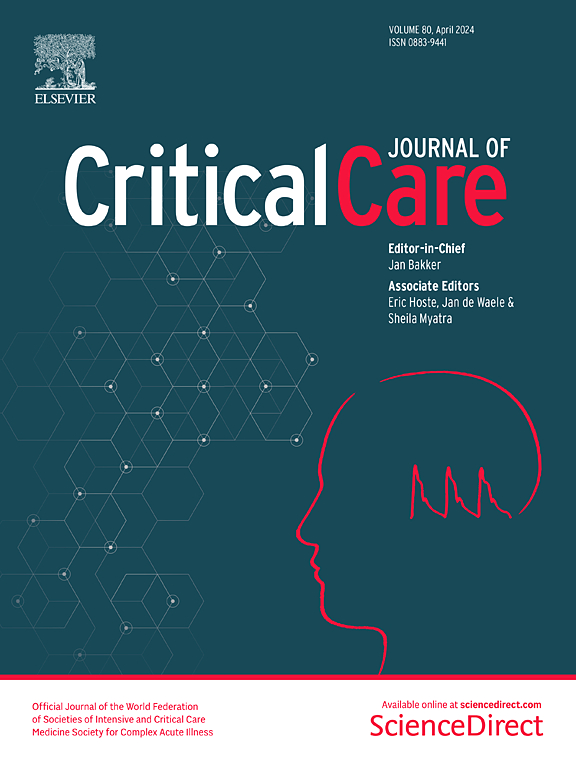Postoperative sepsis and its sequential impact on dementia
IF 8.8
1区 医学
Q1 CRITICAL CARE MEDICINE
引用次数: 0
Abstract
Postoperative sepsis is a severe complication associated with increased mortality and potential long-term cognitive decline, including dementia. However, the relationship between postoperative sepsis and dementia remains poorly understood. This retrospective cohort study used data from the National Database in Taiwan, covering the period from January 1, 2005, to December 31, 2022. The index period for surgeries was set between January 1, 2008, and December 31, 2013, allowing the identification of patients without prior dementia. A landmark period of 12 months following surgery was defined to capture the number of postoperative sepsis events, which were then analyzed for their impact on dementia risk. After 1:4 propensity score matching (PSM), dementia and mortality were evaluated using Cox proportional hazards and Fine-Gray competing risk models. Following PSM, 778 patients were in the postoperative sepsis group and 3,112 in the non-postoperative sepsis group. Dementia incidence was higher in the postoperative sepsis group (26%) compared to the non- postoperative sepsis group (13.6%), with a hazard ratio (HR) of 1.25 (95% CI, 1.03–1.52). A dose–response relationship was observed, with dementia rates of 24.5% for one postoperative sepsis event and 34.9% for two or more events, the latter showing an HR of 1.77 (95% CI, 1.17–2.66). Mortality was also elevated in the postoperative sepsis group (40.5% vs. 31.6%; HR 1.45, 95% CI, 1.28–1.65). Postoperative sepsis is significantly associated with increased dementia risk in a dose-dependent manner. These findings highlight the importance of enhancing perioperative infection control to reduce both immediate and long-term cognitive complications.术后脓毒症是一种严重的并发症,与死亡率增加和潜在的长期认知能力下降(包括痴呆症)有关。然而,人们对术后败血症与痴呆症之间的关系仍然知之甚少。这项回顾性队列研究使用了台湾国家数据库的数据,时间跨度为 2005 年 1 月 1 日至 2022 年 12 月 31 日。手术指数期设定为2008年1月1日至2013年12月31日,这样就能识别出之前未患痴呆症的患者。手术后的 12 个月是一个标志性时期,用于记录术后脓毒症事件的数量,然后分析这些事件对痴呆症风险的影响。经过1:4倾向评分匹配(PSM)后,使用Cox比例危险模型和Fine-Gray竞争风险模型对痴呆症和死亡率进行了评估。经过倾向得分匹配后,术后脓毒症组中有778名患者,非术后脓毒症组中有3112名患者。与非术后脓毒症组(13.6%)相比,术后脓毒症组的痴呆发生率更高(26%),危险比 (HR) 为 1.25(95% CI,1.03-1.52)。观察到一种剂量反应关系,发生一次术后脓毒症的痴呆率为 24.5%,发生两次或两次以上的痴呆率为 34.9%,后者的 HR 为 1.77(95% CI,1.17-2.66)。术后败血症组的死亡率也较高(40.5% 对 31.6%;HR 1.45,95% CI,1.28-1.65)。术后脓毒症与痴呆症风险的增加有明显的剂量依赖关系。这些发现凸显了加强围手术期感染控制以减少近期和远期认知并发症的重要性。
本文章由计算机程序翻译,如有差异,请以英文原文为准。
求助全文
约1分钟内获得全文
求助全文
来源期刊

Critical Care
医学-危重病医学
CiteScore
20.60
自引率
3.30%
发文量
348
审稿时长
1.5 months
期刊介绍:
Critical Care is an esteemed international medical journal that undergoes a rigorous peer-review process to maintain its high quality standards. Its primary objective is to enhance the healthcare services offered to critically ill patients. To achieve this, the journal focuses on gathering, exchanging, disseminating, and endorsing evidence-based information that is highly relevant to intensivists. By doing so, Critical Care seeks to provide a thorough and inclusive examination of the intensive care field.
 求助内容:
求助内容: 应助结果提醒方式:
应助结果提醒方式:


